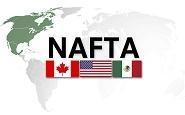Government/Policy

October 2, 2018
Last-Minute Talks Yield New NAFTA--USMCA
Written by Sandy Williams
After months of contentious bargaining, the U.S. has reached a new trilateral trade agreement with Canada and Mexico to replace NAFTA. In last minute negotiations, Canada agreed to give the U.S. increased dairy market access while retaining the Chapter 19 trade remedy dispute settlement.
The new treaty, to be called the U.S.-Mexico-Canada Agreement (USMCA), will require approval by the U.S. Congress, but has met the deadline to allow outgoing Mexican President Enrique Peña Nieto to sign it before leaving office on Dec. 1.
The dairy concession gives U.S dairy farmers access to approximately 3.5 percent of the Canadian dairy market and eliminates the competitive dairy classes.
Steel and aluminum tariffs under Section 232 are not covered by the new agreement, but an accommodation was added to protect Canada and Mexico from potential U.S. Section 232 auto tariffs.
The accommodation allows Canada and Mexico to have 2.6 million autos excluded from any potential tariffs on vehicles imported into the United States. Currently, Canada exports about 2 million and Mexico 1.8 million vehicles to the United States annually. Additionally, any measure imposed by the United States must give Canada and Mexico a 60-day window for negotiations.
Automotive rules of origin will require that beginning in 2020 cars and trucks imported to North America must have 75 percent of their components manufactured in the U.S, Canada or Mexico to avoid tariffs, up from 62.5 percent North American content. In addition, 30 percent of a vehicle’s production must be performed by workers earning at least $16 per hour. The percentage will move to 40 percent in 2023.
A sunset provision agreed to by the U.S. and Mexico in August is included in the USMCA deal. The agreement will be reviewed by the three nations every six years with the option to extend it for an additional 16 years.
“We’ve also included the review and termination provision that we previously announced in our deal with Mexico, which will ensure that we never end up in this position again with an agreement that is stale and outdated and unbalanced in a way that is not beneficial to the United States,” said a U.S. official as reported by Inside US Trade.
The new agreement also contains specific language for the first time on currency manipulation and monetary misalignment practices.
Article 33.4 states: “Each Party confirms that it is bound under the Articles of Agreement of the IMF to avoid manipulating exchange rates or the international monetary system in order to prevent effective balance of payments adjustment or to gain an unfair competitive advantage.”
The Article further states that each party should:
- achieve and maintain a market-determined exchange rate regime;
- refrain from competitive devaluation, including through intervention in the foreign exchange market; and
- strengthen underlying economic fundamentals, which reinforces the conditions for macroeconomic and exchange rate stability.
President Trump called the renegotiated NAFTA deal “truly historic news for our nation and indeed for the world.”
“It’s my great honor to announce that we have successfully completed negotiations on a brand new deal to terminate and replace NAFTA,” Trump said in a press conference from the Rose Garden on Tuesday. “I have long contended that NAFTA was perhaps the worst trade deal ever made.
“I plan to sign the agreement by the end of November. I then will submit it for approval to Congress where in theory there should be no trouble — but anything you submit to Congress is trouble, no matter what,” Trump said.
Trump said tariffs were an important part of the negotiating process. “Just for the babies out there that talk about tariffs—that includes Congress, ‘please don’t charge tariffs.’ Without tariffs, we wouldn’t be standing here,” he added.
Trump remained optimistic regarding passage of USMCA. “If it doesn’t, we have lots of other alternatives,” he said without detailing specifics. “Republicans love it. Industry loves it. If it’s fair, it will pass. I think it will pass easily.”







